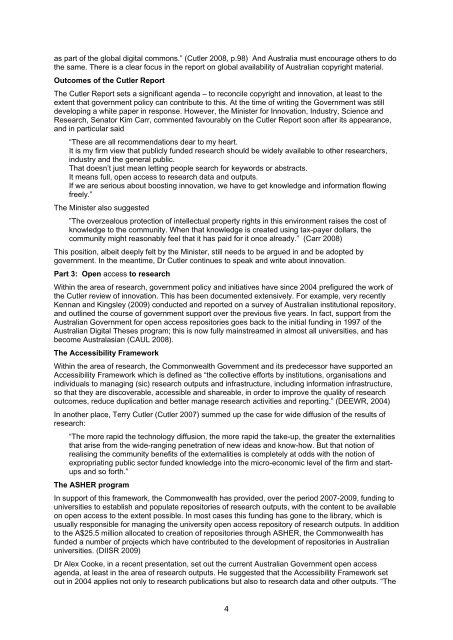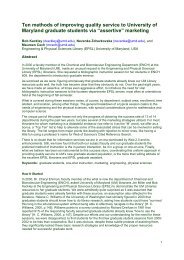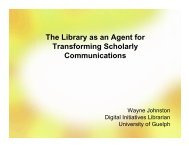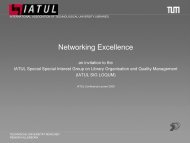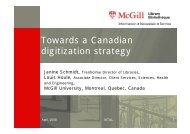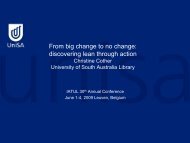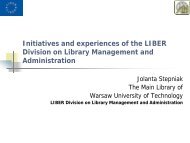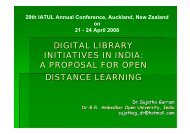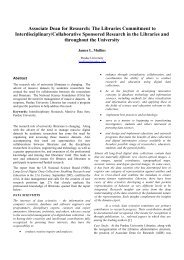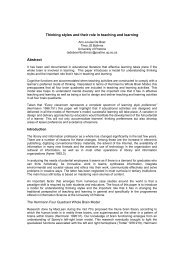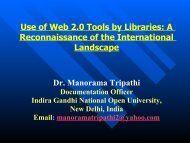Derek Whitehead - IATUL
Derek Whitehead - IATUL
Derek Whitehead - IATUL
Create successful ePaper yourself
Turn your PDF publications into a flip-book with our unique Google optimized e-Paper software.
as part of the global digital commons.” (Cutler 2008, p.98) And Australia must encourage others to do<br />
the same. There is a clear focus in the report on global availability of Australian copyright material.<br />
Outcomes of the Cutler Report<br />
The Cutler Report sets a significant agenda – to reconcile copyright and innovation, at least to the<br />
extent that government policy can contribute to this. At the time of writing the Government was still<br />
developing a white paper in response. However, the Minister for Innovation, Industry, Science and<br />
Research, Senator Kim Carr, commented favourably on the Cutler Report soon after its appearance,<br />
and in particular said<br />
“These are all recommendations dear to my heart.<br />
It is my firm view that publicly funded research should be widely available to other researchers,<br />
industry and the general public.<br />
That doesn’t just mean letting people search for keywords or abstracts.<br />
It means full, open access to research data and outputs.<br />
If we are serious about boosting innovation, we have to get knowledge and information flowing<br />
freely.”<br />
The Minister also suggested<br />
”The overzealous protection of intellectual property rights in this environment raises the cost of<br />
knowledge to the community. When that knowledge is created using tax-payer dollars, the<br />
community might reasonably feel that it has paid for it once already.” (Carr 2008)<br />
This position, albeit deeply felt by the Minister, still needs to be argued in and be adopted by<br />
government. In the meantime, Dr Cutler continues to speak and write about innovation.<br />
Part 3: Open access to research<br />
Within the area of research, government policy and initiatives have since 2004 prefigured the work of<br />
the Cutler review of innovation. This has been documented extensively. For example, very recently<br />
Kennan and Kingsley (2009) conducted and reported on a survey of Australian institutional repository,<br />
and outlined the course of government support over the previous five years. In fact, support from the<br />
Australian Government for open access repositories goes back to the initial funding in 1997 of the<br />
Australian Digital Theses program; this is now fully mainstreamed in almost all universities, and has<br />
become Australasian (CAUL 2008).<br />
The Accessibility Framework<br />
Within the area of research, the Commonwealth Government and its predecessor have supported an<br />
Accessibility Framework which is defined as “the collective efforts by institutions, organisations and<br />
individuals to managing (sic) research outputs and infrastructure, including information infrastructure,<br />
so that they are discoverable, accessible and shareable, in order to improve the quality of research<br />
outcomes, reduce duplication and better manage research activities and reporting.” (DEEWR, 2004)<br />
In another place, Terry Cutler (Cutler 2007) summed up the case for wide diffusion of the results of<br />
research:<br />
“The more rapid the technology diffusion, the more rapid the take-up, the greater the externalities<br />
that arise from the wide-ranging penetration of new ideas and know-how. But that notion of<br />
realising the community benefits of the externalities is completely at odds with the notion of<br />
expropriating public sector funded knowledge into the micro-economic level of the firm and startups<br />
and so forth.”<br />
The ASHER program<br />
In support of this framework, the Commonwealth has provided, over the period 2007-2009, funding to<br />
universities to establish and populate repositories of research outputs, with the content to be available<br />
on open access to the extent possible. In most cases this funding has gone to the library, which is<br />
usually responsible for managing the university open access repository of research outputs. In addition<br />
to the A$25.5 million allocated to creation of repositories through ASHER, the Commonwealth has<br />
funded a number of projects which have contributed to the development of repositories in Australian<br />
universities. (DIISR 2009)<br />
Dr Alex Cooke, in a recent presentation, set out the current Australian Government open access<br />
agenda, at least in the area of research outputs. He suggested that the Accessibility Framework set<br />
out in 2004 applies not only to research publications but also to research data and other outputs. “The<br />
4


